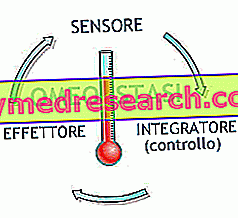Related articles: Hyperglycemia
Definition
Hyperglycemia is an increase in the level of glucose in the blood, above the values considered normal for an adult person. Fasting, normal blood glucose levels are below the 100 milligram threshold per deciliter of blood (mg / dl).
Generally, a range between 100-126 mg / dl is considered a risk, after at least eight hours of fasting; this means that the level of glucose in the blood is unstable and tends to reach excessive concentrations. Instead, one can speak of diabetes in its own right, when fasting blood glucose, checked in several measurements, is higher than 126 mg / dl.
Under pathological conditions, fasting hyperglycemia may occur due to an alteration of hormonal regulation mechanisms, in which insulin and a group of antagonistic hormones, called counterinsular axis, with hyperglycaemic activity (including glucagon, somatotropic hormone, ACTH and glycoactive hormones of the adrenal cortex).
When there is a deficiency of the hormone insulin or a marked resistance to its action (insulin resistance) or an excess of activity by hyperglycemic hormones, the fasting glucose values exceed the normal ones and the post-prandial glycemic increases are higher of those found in physiological conditions.
In addition to diabetes, hyperglycaemia can be traced to numerous endocrinopathies, including: Cushing's syndrome, hyperthyroidism and pheochromocytoma. Other pathological conditions that alter blood sugar levels include acute or chronic pancreatitis, cystic fibrosis and hemochromatosis.
Other causes include a failed or inadequate intake of therapy in diabetic patients (insulin and / or hypoglycemic agents) and an excessive intake of carbohydrates in predisposed subjects.
Some forms of hyperglycemia occur on an iatrogenic basis, ie they may depend on taking certain diuretic drugs, antihypertensives, psychotropic drugs, antineoplastics, corticosteroids, phenytoin and estrogens.
Physical trauma, surgery and severe physical stress can temporarily increase blood glucose levels.
In some cases, the origin of hyperglycemia is to be sought in nerve lesions (endocranial tumors, strokes and head traumas), acute myocardial infarction, sepsis and pancreatic cancer.
Possible associated symptoms
If the blood sugar level rises very quickly it can cause symptoms such as tiredness, increased thirst (polydipsia), large amounts of urine (polyuria), weight loss without apparent cause, abdominal pain and malaise.
In severe cases, mental confusion and loss of consciousness may also occur.
Possible Causes * of Hyperglycemia
- Acromegaly
- Alcoholic ketoacidosis
- Diabetic ketoacidosis
- Diabetes
- Gestational diabetes
- hemochromatosis
- Primitive and Secondary Hemochromatosis
- Cerebral hemorrhage
- Encephalitis
- Pheochromocytoma
- Cystic fibrosis
- Stroke
- Heart attack
- Hyperthyroidism
- Cushing's disease
- Graves' disease - Basedow
- Obesity
- Pancreatitis
- Sepsis
- Turner syndrome
- Metabolic syndrome
- Pancreatic cancer
- Pituitary tumors
- Burns



